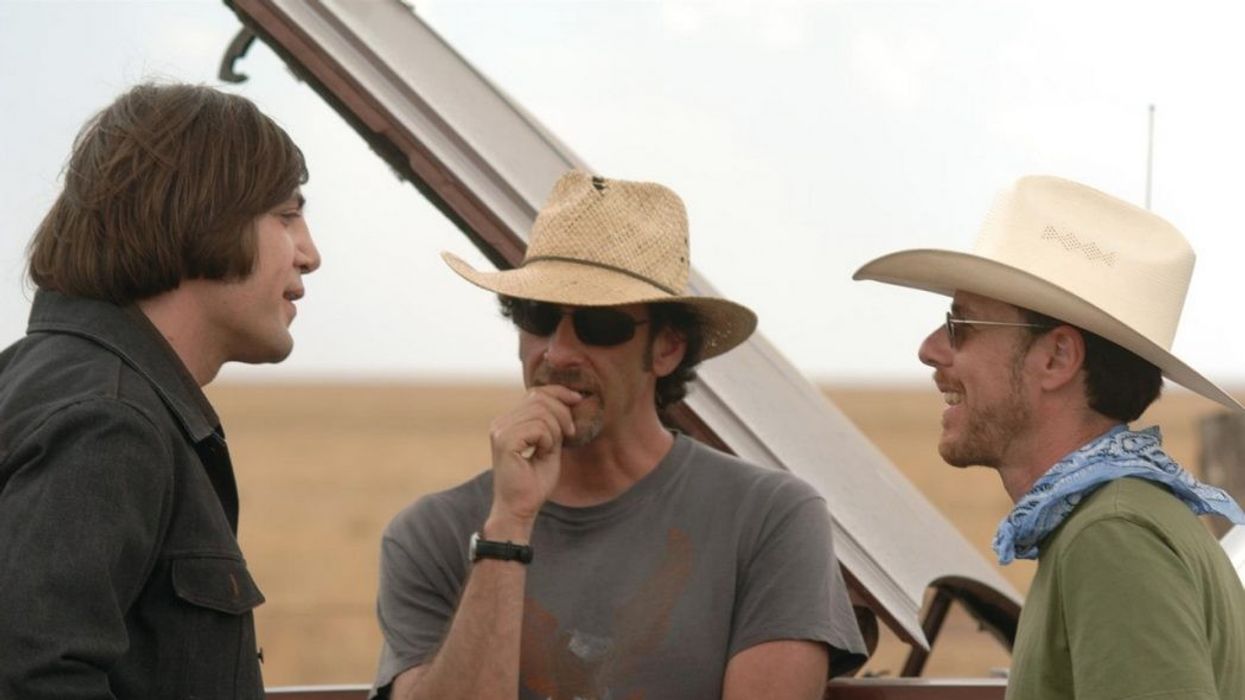4 Great Directing Tips You Can Learn From 'No Country For Old Men'
Learn how the Coen Brothers put their minds together for this masterpiece.

When it comes to modern masterpieces, No Country for Old Men stands out amongst the crowd as a movie that keeps getting better and better with age. It's about greed, anger, fate, god, and lots of other deep emotions. Getting behind the camera for a movie like this is no small feat.
That's why the Coen brothers are such masters. They make it seem simple.
Thankfully, they didn't direct it in silence.
The web series "The Director's Cut" assembled a bunch of interviews with the Coens, cast, and crew that offer some helpful directing tips they learned while making the movie.
To best help, I distilled the video to four general tips the Coens espouse over the course of the interviews to help you better grasp their points. So let's go through them one by one!
1. Thoughts either provoke further thoughts... or they don't
Everyone battles some self-doubt or new "genius" ideas once in a while. Let those thoughts and notes manifest themselves. They could become things that save scenes or spark new intuitions. Or they could become nothing.
Lots of directing is thinking on your feet, being open to change, but not changing things that don't matter or don't pan out. So focus your energy on being open to hearing the ideas, chasing them, and being okay if they really don't go anywhere.
2. Storyboard and plan
The Coens believe in working out the fundamentals before the set and letting the rest come together when the cameras roll.
The duo also admit that they storyboard and plan more than most directors out there. They're meticulous when it comes to casting as well. They take their time and chase the people who feel alive in the part. This takes time, but that's why they only inch forward with projects.
They have a plan when it comes time to shoot, thanks to meticulous storyboards that capture all the angles they want in each scene. they try to pre-imagine the edit and set themselves up for success later. There's elbow room when it comes time to the shoot, they tweak their plans during the walkthrough and rehearsals. But the benefit to planning things out ahead of time like this is that it saves both time and money. And it helps keep everyone in a good mood when they make their days.
3. Find a way to manifest ideas without dialogue
So much of a director's job is to interpret what's on the page visually. To show, not tell. There's real temptation to let the tweaks to the script be additional dialogue, but the Coens have found a way to make characters pop without having them gab about it too much. Instead, time is spent with the actors figuring out body language and sounds that convey ideas.
In No Country, a lot of these things come forward in grunts, passing looks, and the way each person carries themselves throughout the movie. Find subtle ways to keep things going forward, pushing story, and deepening character.
What can your actors do without saying? What can you say by having your actors do things in different scenes?
4. Be a good person
Last but certainly not least, don't be an asshole.
This seems like a no-brainer, but people obviously keep doing it. If you're trying to break in or sustain your career, try being someone people want to work with. In these interviews, Josh Brolin talks about how stellar the Coens' reputation is amongst actors. They're able to cast amazing people because the set is familial and friendly.
When you're building a career build it as good person and a better director. Don't focus all your energy on the movie and disregard the people.
What's next? Read the script for No Country for Old Men!
The best part of the "No Country For Old Men" script PDF is that it always sticks to basics. There's a man chasing. And a man being chased. Let the games begin.
Click the link to learn more!













